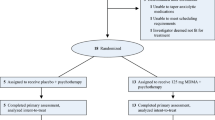Abstract
Hypochondriasis (HA) involves the fear of serious illness despite appropriate reassurances. BecauseHA is associated with patients’ personal suffering and clinical management problems, it is important for clinicians to be knowledgeable about current conceptual and treatment approaches to this problem.
Similar content being viewed by others
References
Kellner R. Functional somatic symptoms and hypochondriasis. Arch Gen Psychiatry. 1985;42:821–843.
Mayo R. The nature of bodily symptoms. Br J Psych. 1976;129:55–60.
Kenyon FE. Hypochondriasis: A survey of some historical, clinical, and social aspects. Br J Psych. 1965;119:305–307.
Asmundson GJ, Taylor S, Sevgur S, Cox BJ. Health anxiety: Classification and clinical features. In: Asmundson GJ, Taylor S, Cox BJ, eds. Health Anxiety. New York: Wiley; 2001:3–21.
American Psychiatric Association. Diagnostic and Statistical Manual of Mental Disorders. 4th ed. Washington, DC; 1994.
Katon W, Ries RK, Kleinman A. The prevalence of somatization in primary care. Comprehen Psychiatry. 1984;25:208–211.
Barsky AJ, Wyshak G, Klerman GL, Latham KS. The prevalence of hypochondriasis in medical outpatients. Soc Psychiatry Psychiatric Epidemiol. 1990;25:89–94.
Freeston MH, Gagnon F, Ladouceur R, et al. Health related intrusive thoughts. J Psychosomat Res. 1994;38:203–215.
Barsky AJ, Ahern DK, Bailey ED, et al. Hypochondrical patients’ appraisal of health and physical risks. Am J Psychiatry. 2001;158:783–787.
Wells A, Hackmann A. Imagery and core beliefs in health anxiety: Contents and origins. Behav Cognit Psychother. 1993;21:265–273.
Warwick HA, Salkovskis PM. Hypochondriasis. Behav Res Ther. 1990;28:105–117.
Beck AT, Emery G, Greenberg R. Anxiety Disorders and Phobias: A Cognitive Perspective New York: Basic Books: 1985.
Barsky AJ, Coeytaux RR, Sarnie MK, Cleary PD. Hypochondriacal patients’ beliefs about good health. Am J Psychiatry. 1993;150:1085–1089.
Schmidt NB, Lerew DR, Trakowski JH. Body vigilance in panic disorder: Evaluating attention to bodily perturbations. J Consult Clin Psych. 1997;65:214–220.
Freeston MH, Rhéaume J, Letarte H, Dugas MJ, Ladoceur R. Why do people worry? Person Indiv Dif. 1994;17:791–802.
Taylor S, Asmundson GJG, Coons MJ. Current directions in the treatment of hypochondriasis. J Cognit Psychother. In press.
Warwick H, Clark D, Cobb A, Salkovskis P. A controlled trial of cognitive-behavioral treatment of hypochondriasis. Br J Psychiatry. 1996;169:189–195.
Clark DM, Salkovskis PM, Hackman A, et al. Two psychological treatments for hypochondriasis: A randomized controlled trial. Br J Psychiatry. 1998;173:218–225.
Author information
Authors and Affiliations
Additional information
The authors have stated that they do not have a significant financial interest or other relationship with any product manufacturer or provider of services discussed in this article. The authors also do not discuss the use of off-label products, which includes unlabeled, unapproved, or investigative products or devices.
About this article
Cite this article
Abramowitz, J.S., Deacon, B.J. Severe health anxiety: Why it persists and how to treat it. Compr Ther 30, 44–49 (2004). https://doi.org/10.1007/s12019-004-0023-1
Received:
Accepted:
Issue Date:
DOI: https://doi.org/10.1007/s12019-004-0023-1




